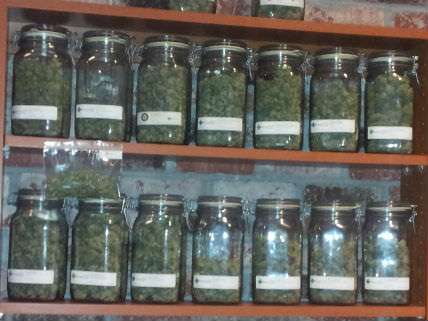Free Pot! (Anti-Tax Message Included)

At yesterday's Senate hearing on marijuana legalization, anti-pot activist Kevin Sabet complained that opponents of heavy cannabis taxes in Colorado "just launched their campaign by handing out 4,000 joints publicly." He was referring to a protest organized by Denver attorney and longtime marijuana activist Rob Corry, who wants to defeat Proposition AA, a November ballot measure that would impose a 15 percent excise tax and a special 10 percent sales tax on pot sold by the state-licensed stores that are supposed to start opening early next year. To call attention to their cause, Corry and his friends gave away joints at Denver's Civic Center on Monday.
The Denver Post reports that "hundreds of people lined up" and that organizers, having brought only 600 joints, "had to furiously roll more on the hood of a parked car." According to KDVR, the Fox station in Denver, "as many as 4,000 marijuana cigarettes were passed out." Whatever the actual number, the publicity stunt was perfectly legal under Amendment 64, which allows people to share up to an ounce at a time "without remuneration," provided the recipient is at least 21. As the Post notes, one ounce "amounts to about 50 or 60 joints" (assuming half a gram per joint), and Corry et al. checked everyone's ID. Or as Corry put it on Mondsay, "It is legal to hand out marijuana to people in Colorado, and it is legal to do it without paying a penny in taxes!" It remains illegal to consume marijuana "openly and publicly" in Colorado, and according to the Post some people attracted by the giveaway did light up their joints right away, but that was not sanctioned by the organizers.
So what exactly is Sabet's beef? No doubt giving away pot offends his sensibilities, but it is explicitly permitted by Colorado law and in this context should be protected by the state constitution's free speech clause as well. Sabet's real objection, judging from his remark that people who campaigned for legalization are now campaigning against the taxes that were supposed to come with it, is to the content of Corry's message. Corry, who helped write Amendment 64, argues that heavy taxes subvert the initiative's intent, which was to tax and regulate marijuana "in a manner similar to alcohol." As I've noted, even the 15 percent excise tax envisioned by Amendment 64 is heavier than the taxes Colorado imposes on alcoholic beverages. Adding the special sales tax, which would initially be set at 10 percent but could later be raised as high as 15 percent, makes marijuana and alcohol taxes decidedly dissimilar. Corry calls that "a bait and switch," warning that heavy taxes will invite a continuing black market.
That problem looms even larger in Washington, where Initiative 502 calls for a 25 percent excise tax at each of three levels. One projection by BOTEC, the consulting group that advised the Washington State Liquor Control Board on how to regulate marijuana, puts the after-tax price of cannabis sold by state-licensed stores at $17 per gram, or $482 an ounce. By comparison, the Price of Weed website, which solicits data from pot buyers across the country, puts the current price of high-quality marijuana in Washington (presumably including marijuana sold by dispensaries, ostensibly for medical use) at $239 an ounce. If the actual price gap between the stores and the gray or black market is anything like that, concedes BOTEC CEO Mark Kleiman, a drug policy expert at UCLA, "that's a big problem," although he argues that some consumers will be willing to pay higher prices in exchange for convenience, "assured quality," and legal clarity. While Colorado's constitution requires separate voter approval of new taxes, Washington's does not, so the pot taxes there have already been enacted and can be changed at will by the state legislature.
Update: In response to criticism from some city council members, Denver police defended their decision not to cite people at the Civic Center on Monday for "openly and publicly" smoking pot, which is punishable by a $100 fine under state law. Deputy Chief David Quinones told The Denver Post:
We have learned from 4/20 events that if we send officers into a crowd this size or bigger, it results in less than cooperative behavior. People tend to turn on the officers. It is a petty offense, not a jailable offense. We don't want to turn this into a small riot to enforce a petty offense. So we weighed our options yesterday and opted not to take action.


Show Comments (86)